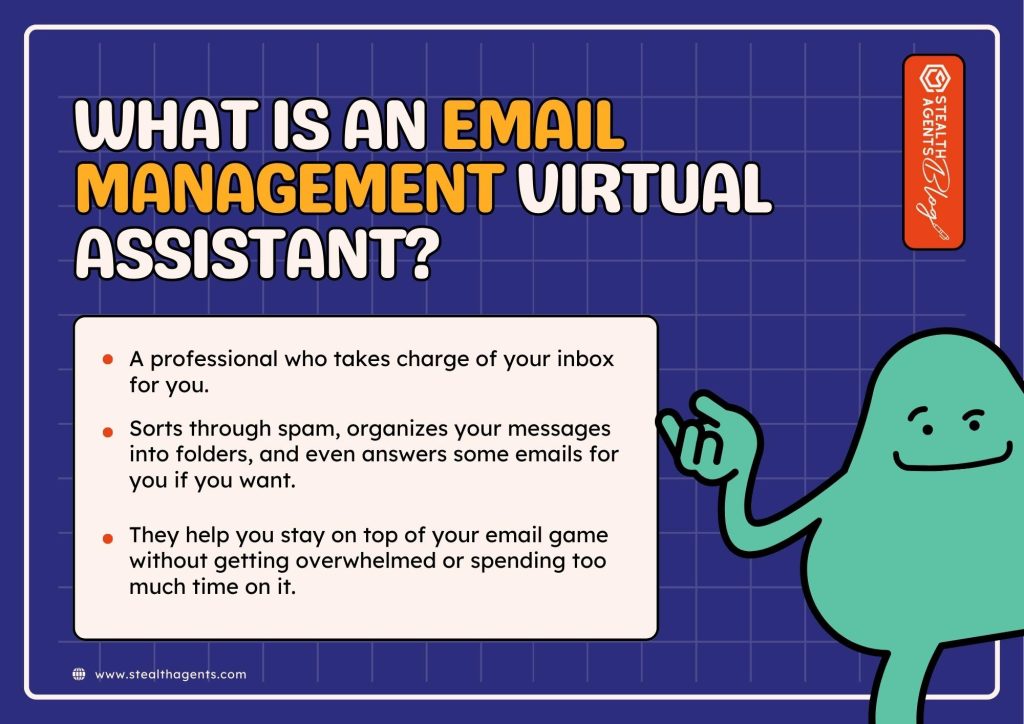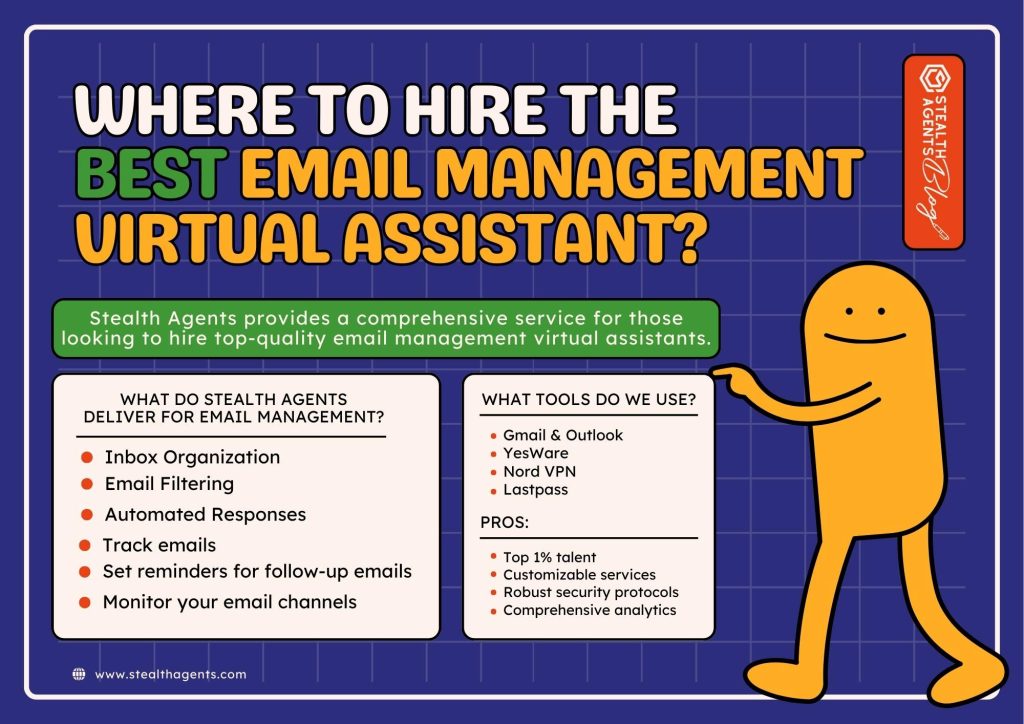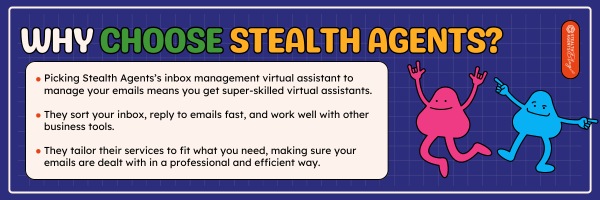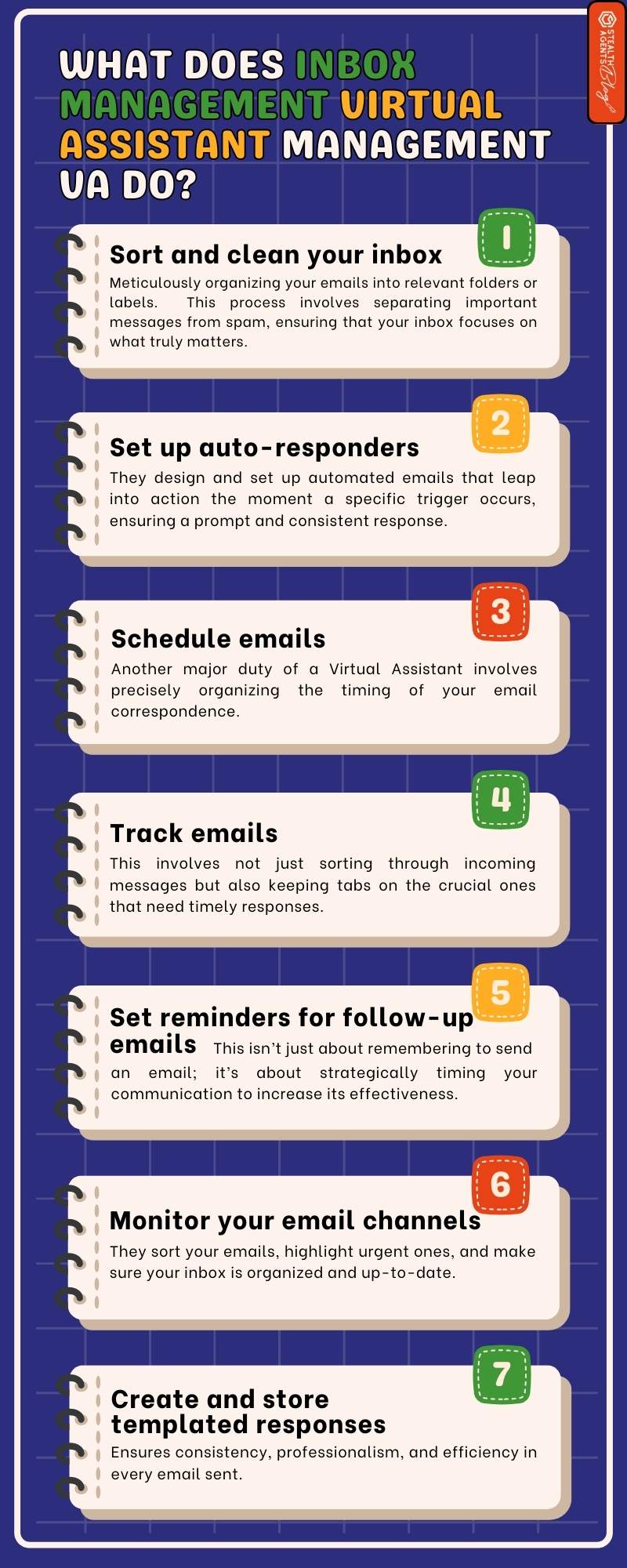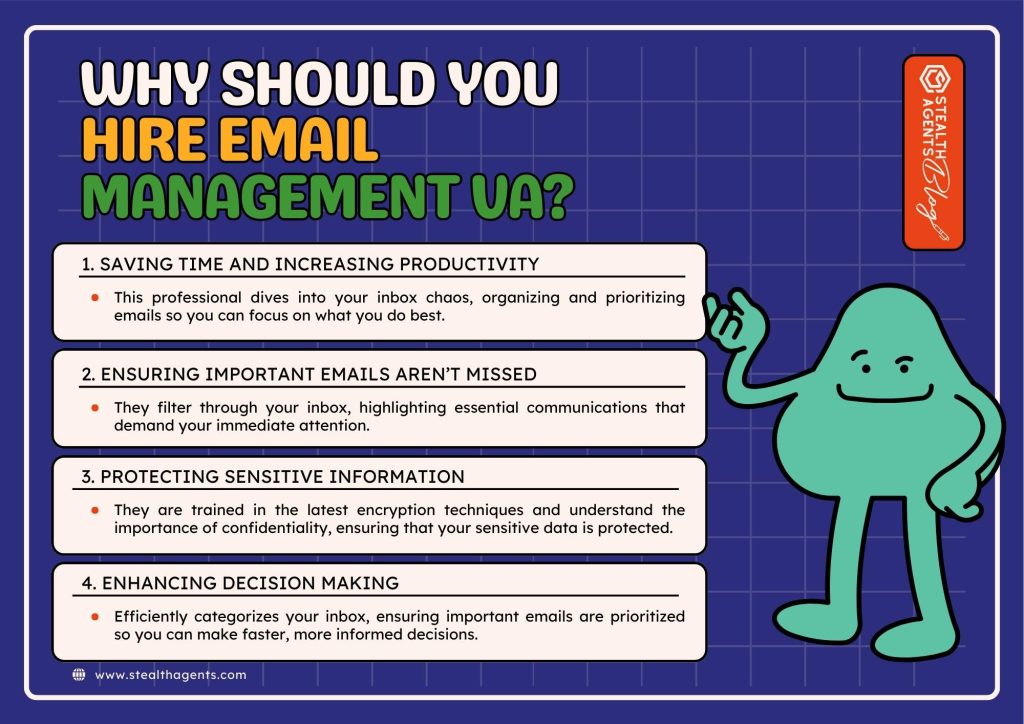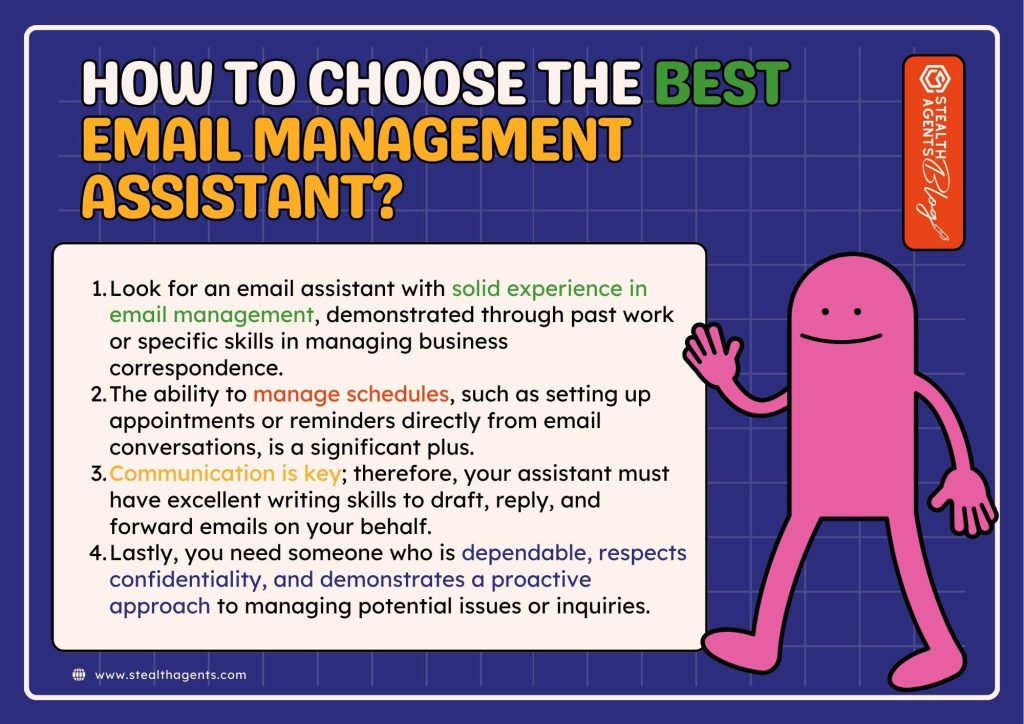Email management virtual assistant services from Stealth Agents help you take back control of your inbox by organizing, prioritizing, and responding to emails so you can focus on what matters most. With expert virtual assistants handling your daily email flow, you’ll save time, reduce stress, and boost productivity effortlessly.
This assistant not only sorts and organizes your emails but also prioritizes them, ensuring you focus on what’s truly important. Hire a virtual assistant partner who is already trained in various software and tools used in your industry.
Set up an appointment to discuss the virtual assistant cost per hour. So, in this article, we’ll discuss the best email management virtual assistant services, their benefits, how to hire an inbox management virtual assistant, and much more. This competitive email management virtual assistant price rate ensures access to highly skilled professionals who can oversee operations, manage appointments, and improve customer service.
What is an Email Management Virtual Assistant?
An Email Management Virtual Assistant, or inbox management virtual assistant, is a professional who takes charge of your inbox for you. They handle all your emails, making sure you only deal with the really important ones.
This assistant sorts through spam, organizes your messages into folders, and even answers some emails for you if you want.
They help you stay on top of your email game without getting overwhelmed or spending too much time on it.
Where to Hire the Best Email Management Virtual Assistant?
Stealth Agents provides a comprehensive service for those looking to hire top-quality email management virtual assistants.
Their VAs are highly skilled in managing and organizing email inboxes, ensuring that important messages are prioritized.
They also handle tasks like scheduling appointments, setting reminders, drafting responses, and integrating email systems with other business tools.
What do Stealth Agents deliver for email management?
– Inbox Organization
– Email Filtering
– Automated Responses
– Track emails
– Set reminders for follow-up emails
– Monitor your email channels
What tools do we use?
– Gmail & Outlook
– YesWare
– NordVPN
– Lastpass
Pros:
– Top 1% talent
– Customizable services
– Robust security protocols
– Comprehensive analytics
Why Choose Stealth Agents?
Picking Stealth Agents’ inbox management virtual assistant to manage your emails means you get super-skilled virtual assistants.
They sort your inbox, reply to emails fast, and work well with other business tools.
They tailor their services to fit what you need, making sure your emails are dealt with in a professional and efficient way.
What Does an Inbox Management Virtual Assistant (VA Do?
1. Sort and clean your inbox
A skilled virtual assistant takes charge of inbox management by meticulously organizing your emails into relevant folders or labels.
This process involves separating important messages from spam, ensuring that your inbox focuses on what truly matters.
The virtual assistant inbox management also unsubscribes from unwanted newsletters and advertisements, reducing clutter and saving you from the overwhelming flood of emails.
It helps you find important emails and respond in a timely manner, making your communication process smoother and more efficient.
2. Set up auto-responders
They design and set up automated emails that leap into action the moment a specific trigger occurs, ensuring a prompt and consistent response.
This level of automation means that your audience or customers feel immediately acknowledged, regardless of the time or day.
Whether it’s a simple “Thank you for contacting us” or a more complex series of emails, auto-responders are the backbone of efficient email communication.
3. Schedule emails
Another major duty of a Virtual Assistant involves precisely organizing the timing of your email correspondence.
They strategically send out emails at moments when they’re most likely to be opened and read.
By analyzing the best times to contact your audience, your VA ensures your emails hit the mark, boosting your open and response rates significantly.
This careful planning increases the effectiveness of your communication and helps in maintaining a consistent connection with your clients and team members.
4. Track emails
This involves not just sorting through incoming messages but also keeping tabs on the crucial ones that need timely responses.
They ensure every email is accounted for and organized, be it by flagging important messages or archiving completed conversations.
This tracking helps in maintaining a clean, efficient inbox, letting you focus more on your priorities without the constant worry of overlooking an email.
5. Set reminders for follow-up emails
This isn’t just about remembering to send an email; it’s about strategically timing your communication to increase its effectiveness.
Whether it’s a gentle nudge after a week or a scheduled check-in a few months down the line, your VA ensures no potential lead falls through the cracks.
Using various email management tools, they keep your inbox organized, making sure that every follow-up is timely.
6. Monitor your email channels
Another crucial role of an email management VA involves carefully watching over your email channels.
This means they regularly check incoming messages, ensuring that nothing important slips through the cracks.
They sort your emails, highlight urgent ones, and make sure your inbox is organized and up-to-date.
This continuous monitoring ensures that responses are swift and relevant, keeping communication lines open and efficient.
7. Create and store templated responses
Creating and storing templated responses is not just about saving time, although that’s a significant advantage. It’s about ensuring consistency, professionalism, and efficiency in every email sent.
When a virtual assistant call center creates these templates, they tailor them to address common inquiries and scenarios, enabling quick and accurate responses to clients, colleagues, and stakeholders.
This structured approach to communication fosters a reliable, professional image for your business and significantly reduces the turnaround time for email replies.
Why Should You Hire an Email Management VA?
1. Saving Time and Increasing Productivity
Saving time and increasing productivity are crucial benefits when you hire an Email Management VA.
This professional dives into your inbox chaos, organizing and prioritizing emails so you can focus on what you do best.
By efficiently managing your correspondence, they ensure you’re only dealing with what truly matters, allowing more hours in your day for vital tasks.
This strategy maximizes your productivity and enhances your work-life balance, giving you back the time to invest in your business or simply relax.
2. Ensuring important emails aren’t missed
They filter through your inbox, highlighting essential communications that demand your immediate attention.
This level of organization goes beyond just keeping your inbox tidy; it’s about prioritizing your workflow and ensuring that opportunities don’t slip through the cracks.
A top virtual assistant becomes your frontline in managing communications, ensuring you stay on top of your game and respond to critical matters promptly.
3. Protecting Sensitive Information
On the other hand, hiring a VA ensures that this crucial information is handled with the highest degree of professionalism and security.
They are trained in the latest encryption techniques and understand the importance of confidentiality, ensuring that your sensitive data is protected.
Their expertise not only helps in safeguarding your information but also fortifies your trust in digital communication.
4. Enhancing Decision Making
Mismanagement of emails often leads to missed opportunities and delayed responses, negatively impacting your business.
An expert assistant efficiently categorizes your inbox, ensuring important emails are prioritized so you can make faster, more informed decisions.
This streamlined approach improves the responsiveness of your business and elevates the overall decision-making process.
How to Choose the Best Email Management Assistant?
First, look for an email assistant with solid experience in email management, demonstrated through past work or specific skills in managing business correspondence. They should be proficient in using email platforms (such as Gmail, Outlook, etc.) and familiar with email etiquette to represent them professionally.
An effective email management virtual assistant will have exceptional organizational skills to categorize emails and prioritize messages based on urgency and relevance. The ability to manage schedules, such as appointment setting or reminders, directly from email conversations is a significant plus.
Communication is key; therefore, your assistant must have excellent writing skills to draft, reply to, and forward emails on your behalf. They should be able to understand and match your tone of voice to ensure consistency in your communications.
Lastly, you need someone who is dependable, respects confidentiality, and demonstrates a proactive approach to managing potential issues or inquiries.
Takeaways
In conclusion, hiring virtual assistants for email management can greatly benefit your overall productivity and success.
With their help, you can stay on top of your emails, maintain a professional image, and achieve greater efficiency in your work.
Consider working with a top 1% virtual assistant based in the Philippines to experience these benefits firsthand.
So why wait? Start delegating your email management tasks today and see the positive impact it can have on your business or personal life.
Remember, time is a valuable resource, and by outsourcing this task, you’ll have more time to focus on other important aspects of your work.
So don’t hesitate to invest in a virtual assistant for email management and take control of your inbox!
Are you tired of sifting through endless emails? Let our skilled virtual assistants take care of your inbox. You can save time and reduce stress today. Get started now
Frequently Asked Questions
How much does an email management virtual assistant cost per hour?
Email management virtual assistants usually charge $5-25 per hour. Beginners may charge $5-10/hour, while experienced assistants with advanced skills charge $15-25/hour. Some providers offer package deals or monthly plans that lower the hourly rate for regular work.
What qualifications should I look for in an email management virtual assistant?
Look for someone with experience managing emails, who knows how to use platforms like Gmail, Outlook, or Thunderbird. They should also be familiar with CRM tools, have strong written English skills, and know how to use automation tools like Zapier or IFTTT. Certifications in Google Workspace or Microsoft Office are a plus.
What email platforms and tools do virtual assistants use?
Email management VAs commonly use Gmail, Outlook, Apple Mail, and Thunderbird. They also work with tools like HubSpot or Salesforce for CRM, Mailchimp for email automation, Calendly for scheduling, and apps like Asana, Trello, or Slack to manage tasks and communication.
How do I keep my data safe when hiring an email management virtual assistant?
Make sure your assistant signs an NDA, uses a secure password manager, works on encrypted connections, and follows your company’s security rules. They should also use two-factor authentication and understand any privacy rules, like GDPR, that apply to your business.
Which industries benefit most from email management virtual assistants?
Industries like real estate, healthcare, legal services, e-commerce, consulting, coaching, and executive roles benefit the most. These fields often involve scheduling, client follow-ups, managing leads, and handling important or regulated communications.
How long does it take to train an email management virtual assistant?
Basic email tasks usually take 1-2 weeks to train, while more complex workflows involving multiple systems may take 2-4 weeks. The time depends on how much email you handle, your specific processes, and the assistant’s experience with similar work.
Can email management virtual assistants work across time zones?
Yes, many email management VAs can work across time zones. This can even be helpful for 24/7 email monitoring and quicker responses. Using shared calendars, clear communication rules, and agreed working hours makes it easy to coordinate, no matter where they are.
What’s the difference between email management virtual assistants and automated tools?
Virtual assistants can make decisions, write personalized replies, and handle tricky or sensitive emails. Automated tools are good for sorting, scheduling, or sending basic emails, but they can’t understand context, build relationships, or handle unique situations like a human assistant can.
How do I measure the value of hiring an email management virtual assistant?
Track how much time you save each week, how quickly emails are answered, how many emails are handled, and how many important emails are no longer missed. Compare the assistant’s cost to the value of your time saved to see the return on your investment.
What backup plans should I have if my email management virtual assistant is unavailable?
Keep clear instructions for email tasks, updated templates, and contact lists. Use a secure password manager for access. Train a backup assistant or team member on your systems. If you work with an agency, they may offer a replacement assistant and keep detailed records to make transitions easier.


